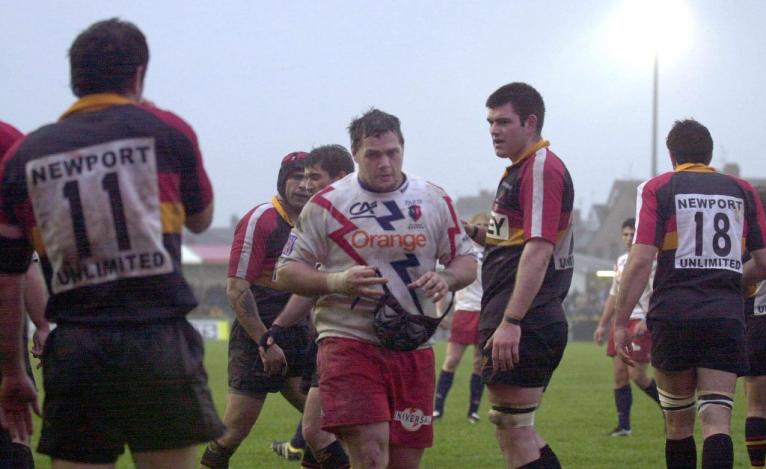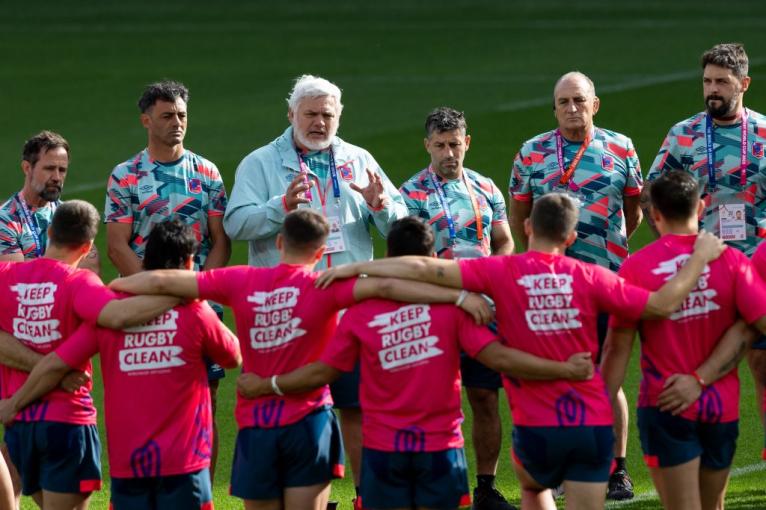There is no quick or pithy way to introduce Pablo Lemoine, one of the most influential figures on the Emerging Nations scene. The first adjective that pops to mind is ‘thinker’, a sports philosopher, someone who specialises in identifying problems and finding solutions. The hulking former Uruguay prop is much more than that, of course. Lemoine is a proactive and proficient coach, who seeks answers and compromises even when they require great sacrifice.
This introduction sounds a bit heavy, but ‘heavy’ is the perfect homage to someone who mastered one of rugby’s most physically demanding battlegrounds: the scrum. And it is exactly from that set-piece a long conversation spawns. Does the scrum still matter?

“For me, the scrum is what makes rugby, rugby,” Lemoine begins. “It’s the true identifiable feature of our sport if you compare it to rugby league, sevens, American football or other sports. The scrum epitomises teamwork in a battle context.
“You cannot look at it and think its only purpose is to lose time or to break up the game. It takes discipline, time, and a connection between players to build a steady one, and that is what rugby is all about. It is a collision of inertia, mass and power, and we should be selling it more broadly and not hide or depower it. We must value it. Without it, rugby loses its essence.”
As a player, Lemoine had a major hand in Stade Français’ back-to-back French titles in 2003 and 2004, spent two years with Bristol, and helped Uruguay qualify for their first Rugby World Cup in 1999. He is one of a handful of people to have played or coached in four men’s World Cups. The 49-year-old savoured these moments on the field more than he did coaching Chile to their first appearance at the global showpiece last year.
“I still remember my first World Cup game, when we defeated Spain. Even if most of what I remember is scrummaging non-stop, that feeling of playing in Uruguay’s first World Cup game is unforgettable.
The Chilean Rugby Union has the vision of making rugby the number-two sport in the country, a goal I share in full.
“It is definitely [more enjoyable] as a player. As a coach, when the campaign starts, I want it to end immediately. I am very obsessed with everything, be it how we train, play, or work as a team, while dealing with the crazy pressure a World Cup brings, especially when you play against the best.
“It leaves little space to enjoy the whole experience, as you have to deal with your team, press, fans, your thoughts, and other’s thoughts. It’s a 100% different experience. I was lucky enough to have enjoyed both roles.”
Chile’s qualification was a remarkable tale of sporting theatre, underpinned by national franchise Selknam, the team Lemoine had a major role in putting together when he took the job in 2018. Los Condores’ two-legged final against USA would seal a spot in France. After a gritty and emotional 22-21 loss in Santiago, Chile stunned their fancied hosts 32-29 in a see-sawing Colorado affair which went to the death. Though they did not win a pool match, Chile left the World Cup with heads held high, the culmination of a major dream for the country. Lemoine’s objective, however, is greater still.
“The Chilean Rugby Union has the vision of making rugby the number-two sport in the country, a goal I share in full. It will require great commitment and work, specifically in two areas: commercial and social. We need more hinchas [the traditional sports fans in South America], more tickets and merchandise sold, the sponsorship boosted. This is what’s called true sports development, which, unfortunately, is one of the biggest issues when it comes to Tier Two nations.
“Most of these unions are focused on one goal, and that’s the World Cup race. Look, if we connect the high-performance area of the game to the social part, which means building our fan base, developing a strong relationship and boosting our brand, it will turn on the attention of the political eye.”
View this post on Instagram
Lemoine’s men have already started down the road to Australia 2027, with the winner of next year’s Sudamerica Rugby Championship guaranteed a spot at the expanded tournament. Without qualification, he warns, “there’s a chance you will simply vanish from the public eye”.
Having lived and played in Europe, Lemoine recognises a major detail differentiating the most established nations and those such as the one he coaches.
“Our reality is different from what happens in England, France, New Zealand, South Africa, or the rest of the top 10 of the rugby world. Their community is already integrated and deeply connected to the sport. They have a community, while we still are working to create an ever-lasting one. We lack the structures to support the high-performance programmes in the long term, as without a widespread fanbase and community we can’t boost sales of any kind.
“We will not make the highlights of the mainstream press, going in a never-ending cycle of survival. We cannot only depend on World Rugby. We have to generate revenue, which is something rugby has failed to do in most Tier Two nations. The examples of Georgia and Fiji are two of the best when we talk about strong development at a local and national level. They were able to intertwine rugby in the press, build a reliable relationship with the political powers, and foster a solid sponsorship with private companies. They have become a national product, respected by all, and that’s managing to grow year after year.”
You can have the best grassroots/development programme there is, but without the high-performance programme you won’t get far. It’s fundamental for us to escape the curse of losing viewership when things start to not go our way.
The Chilean Rugby Union has made an effort to decentralise the Test matches played by the national team, an effort to introduce more fans to the game and develop a dedicated following.
“You can have the best grassroots/development programme there is, but without the high-performance programme you won’t get far. People will be more aware of the high-performance level. The World Cup brings that to an even higher level, creating new fans who will be in the stadium not to support rugby per se, but to support their country. This is the success of the top level of the game, and I think Chilean rugby has done well by, for example, playing games outside of Santiago [Chile’s capital]. The most important word for Chile right now is connection. We need to inspire new fans, train and play in different cities, and integrate rugby into new communities.
“Against Hong Kong in July we had 9,000 fans; then against Belgium in Viña del Mar there were almost 15,000; and when Scotland came to Santiago to play in the Estádio Nacional, which normally is football-exclusive, we were close to breaking the 30,000-fan mark. We are slowly progressing. It’s fundamental for us to escape the curse of losing viewership when things start to not go our way.”
 Chile lost their pool matches to Japan, Samoa, England and Argentina, but were proud of their performance in France (Photo by David Ramos – World Rugby/World Rugby via Getty Images)
Chile lost their pool matches to Japan, Samoa, England and Argentina, but were proud of their performance in France (Photo by David Ramos – World Rugby/World Rugby via Getty Images)
While sipping mate – a herbal drink from South America – at his home in Uruguay, Lemoine considers how his playing days, straddling the amateur game and some of the biggest teams in professional rugby, have shaped his view of coaching. He instilled a deeper understanding of professionalism in the Chilean players, who had not been exposed to the new high-performance structures.
“There’s a big social change in their lives. They have to make changes to their work, school, family, and leisure agendas to adapt to the needs of the national team. Those are the players we are looking for, as they will be closer to becoming professionals.
“And for that, we need to encourage them with wages or other stimuli, so we don’t lose those who are ready to make the sacrifices. When we started working with Chile, we agreed training would start at 6am, as it wouldn’t overlap with their work, studies and personal lives. So, those who didn’t show up just weren’t invested enough to be part of the team.
“Those who want to become athletes need to be athletes; they must adapt to the circumstances. Sometimes, or even most times, the high-performance level of any sport isn’t fun. For me, it’s vital to be honest to the players, to make them understand the demands and the road they have ahead.”
Lemoine sees, in South America, a fertile breeding ground for the sport. Argentina have long been established as a powerhouse, while Uruguay have made massive strides in the sevens and XVs game, and Chile are hot on their heels.
“In 2023 rugby faced a very problematic situation: the absence of three of the biggest countries from the World Cup, population-wise. USA, Russia, and Canada weren’t present.
“South America has the potential to become a great land for rugby. There are some obstacles like how football eats the biggest slice of the cake, financially and socially, but even so, there’s a good chance to implement rugby as one of the main sports in South America. We need to focus on nurturing a good product, how to work it and spread it, and planning things with care and structure.
“South America is the best region to grow rugby, but we need more resources so we can finally make the jump. As things stand, it will be hard for any of the South American unions to boost things when we only have one direct qualifying spot for the men’s World Cup.”

With his family waiting, RugbyPass challenged Lemoine to share one final mantra.
“Everything and anything is possible. I learned that from my lifetime experience of working on a vast number of rugby projects. With enough time, trust and belief, everything is achievable. Does it require sacrifices? Yes, especially in giving up our free time or to learn how to lose, mourn and overcome obstacles.
“Rugby offers that chance to turn an impossible situation into something possible. That’s a special power of our sport: the potential to change things. There’s always a second chance waiting for you, if you want to work for it.”


Comments
Join free and tell us what you really think!
Sign up for free